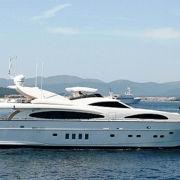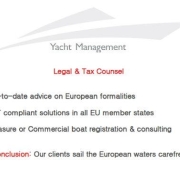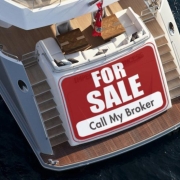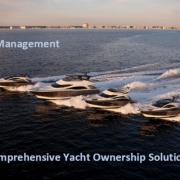Mediterranean Yacht Broker advice for Sellers and Buyers
12 January 2016




Allied Yachting provides these guidelines to guide its customers, covering some of the questions most often raised, when using a yacht Broker in the course of the sale or purchase of a boat:
a) as a Seller’s Broker (when selling a boat)
b) as a Buyer’s Broker (when purchasing a boat)
c) as both of the above (when being the only intermediary)
ROLE OF A YACHT BROKER
A Broker’s business is to market the Seller’s boat which will include arranging viewings, negotiating the terms of sale, handling the paperwork and obtaining agreement for distribution of the sale price. A Broker may also carry out title and financial checks, provide documentation in support of the vessel’s VAT status and evidence of class, building and several other dispositions compliance. For doing this work the Broker normally charges the Seller (and sometimes the Buyer) an agreed commission fee, generally a total of 10% of the gross sales price for MYBA members.
BROKER REPRESENTATION & INSURANCE
We recommend only using a Brokerage firm that is a member of a representative organisation, like the Mediterranean Yacht Brokers Association (MYBA), since we abide to a very strict code of ethics and operate under clear rules that define the customs and practices of our profession.
At Allied Yachting, our code of ethics demands we have equal responsibilities and duties towards both the Seller and the Buyer.
Yacht Brokers are exposed to boat handling, custody and showings risks as well as errors or omissions in their professional activity, so a serious professional Brokerage firm must have an adequate insurance policy covering these eventual liabilities.
STANDARD CONTRACTS
We advise potential Sellers and Buyers to familiarise themselves with key aspects of these contracts:
Contractual terms of business between Seller and Broker in the form of a Listing Agreement:
- Central Agency Agreement, when proposing a boat for sale under exclusivity
- Sale Mandate – Open Listing/Agency, when proposing a boat for sale with no exclusivity
Standard Sale and Purchase Agreement between Seller and Buyer:
- Memorandum of Agreement (MOA)
- Similar Purchase Order (New boats), Sales Agreement or Bill of Sale
The use of a Co-Brokerage Agreement is also frequent and provides exclusivity for the sale of a boat to 2 joint-Brokers, sharing marketing efforts.
BROKER RESPONSIBILITIES INCLUDE THE FOLLOWING:
- The yacht Broker shall collect all available title documentation from the Seller which should include, class and compliance certificates, evidence of VAT status, registration, outstanding finance, bills of sale from previous owners and builder’s certificate. The Broker should arrange for a new bill of sale from Seller to the Buyer to be completed and passed with all title documentation upon completion.
- The yacht Broker should provide a Sale and Purchase Agreement for review and use by the Seller and Buyer. Amendments to the agreement should be agreed and initialled by both parties.
- The Broker should check as far as possible whether there are any outstanding mortgages, liens or bills relating to the boat and should make sure these sums are settled before completion and before sending the balance to the Seller.
- The Broker should send completion monies to the Seller as soon as the funds have cleared and all documentation has been completed.
- The Broker shall use best endeavours to ensure that all boats offered for sale conform to relevant legislation.
- The Broker should ensure that information given to a Buyer is accurate and that defects known to the Broker must be pointed out to the Buyer and the Seller.
- The use of a Sale and Purchase Agreement (MOA) for a second-hand or pre-owned boat is recommended for use on all occasions. The Sale and Purchase Agreement should include an inventory which itemises the components and accessories included within the sale. The purpose of this is to manage expectations as to what the boat comes with and excludes. The Broker should ensure that the Buyer understands the particulars of the Sale and Purchase Agreement.
- The Buyer should employ a qualified marine surveyor to carry out a full condition survey. The Broker should make sure that a surveyor is entirely independent, even if he recommends him.
- Buyers are also advised to carry out a sea trial to test the boat and check propulsion and other relevant systems in navigation. Buyers should be aware that they are responsible for the costs associated with sea-trial and lift out/in for survey.
- Yacht Brokers should keep sales proceeds entirely separate from their own business account in a bona fide designated Client account or escrow to protect the Buyer’s money.
DELETION
Upon sale and before completion, the yacht Broker must ensure that the vessel is properly deleted from its previous registry upon the request of the vessel owner or an authorized agent on behalf of the owner. The request must be in writing and must include the vessel’s official number and reason for deletion (Sale). The original Certificate of Deletion (COD) is to be returned by the owner named on the certificate.
At Allied Yachting, we propose this service upon the Sellers’ instruction.
REGISTRATION
At Allied Yachting, we also propose registration service and a Buyer may wish us to transfer the ownership of a registered boat on his behalf. A Buyer can instruct the yacht Broker separately on this issue so that he is acting for the Buyer alone when he transfers title.
If the Buyer, his professional advisors, or the Broker have preliminarily and adequately investigated title then transfer of registry should be simple and straightforward.
Deletion / Registration fees may apply in both cases.











